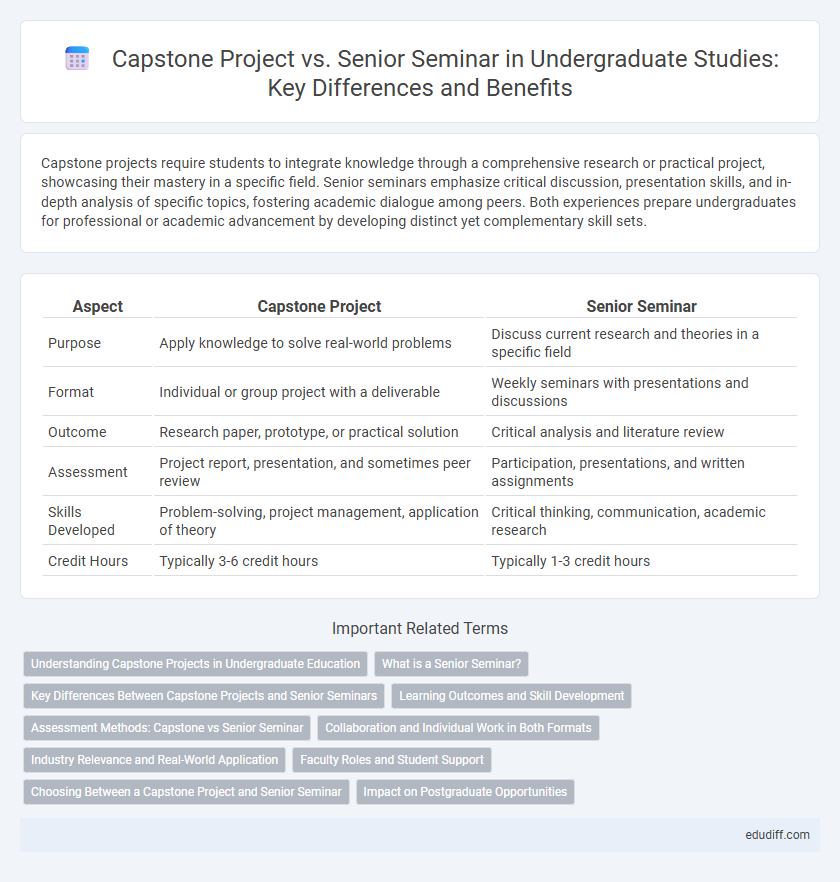Capstone projects require students to integrate knowledge through a comprehensive research or practical project, showcasing their mastery in a specific field. Senior seminars emphasize critical discussion, presentation skills, and in-depth analysis of specific topics, fostering academic dialogue among peers. Both experiences prepare undergraduates for professional or academic advancement by developing distinct yet complementary skill sets.
Table of Comparison
| Aspect | Capstone Project | Senior Seminar |
|---|---|---|
| Purpose | Apply knowledge to solve real-world problems | Discuss current research and theories in a specific field |
| Format | Individual or group project with a deliverable | Weekly seminars with presentations and discussions |
| Outcome | Research paper, prototype, or practical solution | Critical analysis and literature review |
| Assessment | Project report, presentation, and sometimes peer review | Participation, presentations, and written assignments |
| Skills Developed | Problem-solving, project management, application of theory | Critical thinking, communication, academic research |
| Credit Hours | Typically 3-6 credit hours | Typically 1-3 credit hours |
Understanding Capstone Projects in Undergraduate Education
Capstone projects in undergraduate education emphasize applying cumulative knowledge through comprehensive, research-based assignments that integrate theory and practice specific to a student's major. These projects commonly involve real-world problem-solving, requiring students to demonstrate critical thinking, project management, and professional communication skills. Senior seminars, in contrast, typically center on discussion, analysis, and synthesis of key concepts within a discipline, fostering critical reflection rather than extensive project execution.
What is a Senior Seminar?
A Senior Seminar is a specialized, discussion-based undergraduate course designed to synthesize knowledge gained throughout a student's academic career, typically emphasizing critical thinking, advanced research, and presentation skills. It often involves collaborative analysis of complex topics within a student's major, fostering intellectual engagement and in-depth exploration of subject-specific issues. Unlike a Capstone Project, which centers on creating a comprehensive, practical final project, a Senior Seminar focuses more on scholarly discourse and academic inquiry.
Key Differences Between Capstone Projects and Senior Seminars
Capstone projects emphasize practical application, requiring students to complete a comprehensive project or research that addresses real-world problems, often culminating in a final presentation or report. Senior seminars focus primarily on in-depth discussion, critical analysis, and synthesis of academic literature within a specific discipline, fostering collaborative learning and advanced writing skills. The key difference lies in capstone projects demanding tangible deliverables and hands-on experience, while senior seminars prioritize intellectual engagement and theoretical understanding.
Learning Outcomes and Skill Development
Capstone Projects emphasize applying interdisciplinary knowledge to solve real-world problems, enhancing critical thinking, research, and project management skills. Senior Seminars focus on in-depth analysis, academic discourse, and advanced writing abilities, fostering expertise in a specific subject area. Both experiences develop collaboration and communication skills but differ in practical application versus theoretical exploration.
Assessment Methods: Capstone vs Senior Seminar
Capstone projects emphasize performance-based assessments such as portfolios, presentations, and real-world problem-solving evaluations that demonstrate comprehensive application of knowledge. Senior seminars primarily utilize analytical essays, class discussions, and written exams to assess critical thinking, theoretical understanding, and scholarly communication. Both methods prioritize different dimensions of learning assessment, with capstone projects focusing on practical outcomes and senior seminars on academic analysis.
Collaboration and Individual Work in Both Formats
Capstone projects emphasize collaboration, requiring students to work in teams to integrate interdisciplinary knowledge and solve complex problems, fostering communication and project management skills. In contrast, senior seminars prioritize individual work, encouraging deep independent research, critical thinking, and personal academic development through presentations and papers. Both formats balance teamwork and autonomy, preparing undergraduates for diverse professional environments.
Industry Relevance and Real-World Application
Capstone Projects in undergraduate programs emphasize direct industry relevance through collaborative partnerships and problem-solving based on real-world business challenges, fostering practical experience and applied skills. Senior Seminars focus on in-depth academic research and theoretical analysis, often culminating in presentations that showcase critical thinking and subject mastery without necessarily engaging industry stakeholders. The Capstone Project's alignment with current industry practices better prepares students for immediate workforce integration by simulating professional environments and project management scenarios.
Faculty Roles and Student Support
Faculty in Capstone Projects serve as active mentors, guiding students through complex research and practical applications that integrate knowledge from their undergraduate curriculum. In Senior Seminars, faculty primarily facilitate critical discussions and provide feedback to refine students' analytical and presentation skills. Both settings require faculty to offer personalized support, but Capstones demand more intensive, project-based mentorship while Senior Seminars emphasize intellectual engagement and peer collaboration.
Choosing Between a Capstone Project and Senior Seminar
Choosing between a Capstone Project and Senior Seminar depends on your academic goals and learning style. A Capstone Project emphasizes hands-on research and practical application, ideal for students seeking to showcase their problem-solving skills through a comprehensive, semester-long project. Senior Seminars focus on discussion-based analysis of specialized topics, perfect for those interested in deepening critical thinking and communication abilities within a collaborative environment.
Impact on Postgraduate Opportunities
Capstone projects demonstrate a student's ability to apply theoretical knowledge to real-world problems, significantly enhancing postgraduate research opportunities and admission prospects. Senior seminars emphasize critical analysis and academic discourse, strengthening skills essential for graduate-level coursework and comprehensive exams. Both experiences contribute uniquely to building a competitive profile for advanced studies.
Capstone Project vs Senior Seminar Infographic

 edudiff.com
edudiff.com